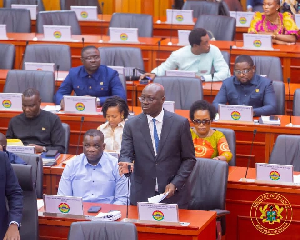By: Napo Ali Fuseini & Justice Lee
The incidence of water pollution by mining firms have increased in the country since the last report by the Commission for Human Rights and Administrative Justice (CHRAJ) in 2oo8 on human rights abuses in mining communities.
In an interview with The Lead the Executive Director for WACAM Daniel Owusu Koranteng was worried that very little or no action at all had been taken by authorities to prevent the continuation or repeat of such occurrences again.
“Mining companies continue to poison people living in mining communities since no major action has been taken to deal with the situation,” he noted with concern.
Mr Koranteng alluded to the Akoben report by the Environmental Protection Agency (EPA) in 2010 on the performance of mining firms which also revealed that the companies observed poor environmental standards. The 2010 AKOBEN report revealed that almost all the major mining companies could not measure up to environmental standards in their operations in the country. Major firms such as AngloGold Ashanti, Newmont Ghana, Ghana Bauxite Company Limited-scored RED (poor) in the seven category final rating. This he blamed on the country’s failure to institute stringent environmental laws to ensure that best environmental practices are observed by mining firms.
CHRAJ in 2008 revealed that a total of 82 rivers and streams in five mining communities in Ghana had either been polluted, destroyed, diverted or dried- up due to activities of mining firms.
Obuasi, Ghana’s Johannesburg ranked high on the list of communities whose water sources were destroyed followed by Wassa communities. According to the finding by the Commission of Human Rights and Administrative Justice (CHRAJ) fifty (50) rivers and streams were destroyed in Obusai area, twenty (26) in Wassa area, three( 3) in Bibiani, two (2) in Ahafo/Tepa area and one(1) in Yalei,in the Upper East region where small scale miners operated.
The investigations conducted by CHRAJ between 2006 and 2008 into the operations of seven (7) mining companies in Obuasi, Wasa West, Bibiani, Asutifi &Tepa areas, as well as New Abirem areas, indicted the mining firms for poor environmental standards leading to the destruction of water sources within their locals.
AngloGold Ashanti, Gold Fields Ghana Ltd, Newmont Ghana, Golden Star Resources, Ghana Manganese Company Ltd, Ghana Bauxite Company Ltd and Chirano Gold Mines Ltd were found to have disregarded best mining practices.
The findings established among other things evidence of widespread pollution of water resources depended on by these communities with pollutants exceeding the World Health Organization (WHO) maximum allowable limits for drinking water.
According to CHRAJ’s report, “test water sampled from water sources in 22 of the 28 mining communities showed that at least two water quality parameters with health implications, were present and in concentrations significantly higher than the WHO maximum allowable limits for drinking water.”
In Obuasi in particular, nearly all water bodies had at least two measured parameters with augmented concentrations relative to WHO maximum limits for such substances.
“Streams at Binsere, Sansu, Kwatia, Pokom, Anyinam, Odumasi Kao and Donkyiwaa have high concentration of four to six measured parameters above WHO limits. In some of the water bodies, the concentration of some of the parameters is more than hundred times the WHO guide values.”CHRAJ asserted in its report.
“In the Prestea-Tarkwa area, 8 water sources had elevated levels of at least two water quality parameters above the maximum allowable limits. A borehole at Huniso recorded concentrations of lead and manganese higher than WHO allowable limits”.
Traces of silica and iron were found in boreholes at Teberibe and Hemang. Other metals such as nickel, zinc, manganese, iron and silica were also found in waters around Bibiani.
Mr. Koranteng underscored the need for the country to go beyond making public disclosures on poor environmental practices, to the implementation of such measures that will punish and discourage firms that pollute the environment.
“It is not just enough to make these findings; we must pass laws and ensure that they are enforced”
Commenting, Executive Secretary of the Water Resources Commission (WRC) Ben Ampomah said water pollution had become a national issue.
According to him, the laws on pollution were not punitive enough, as the commission needed to negotiate with mining firms such as Anglogold and Newmont for remedies any time pollution occurs.
He however believed that the major area of concern was not the big mining firms whose activities were easy to monitor, but rather illegal small scale miners whose activities were not easy to monitor. Source: The Lead
General News of Wednesday, 17 August 2011
Source: Napo Ali Fuseini & Justice Lee












